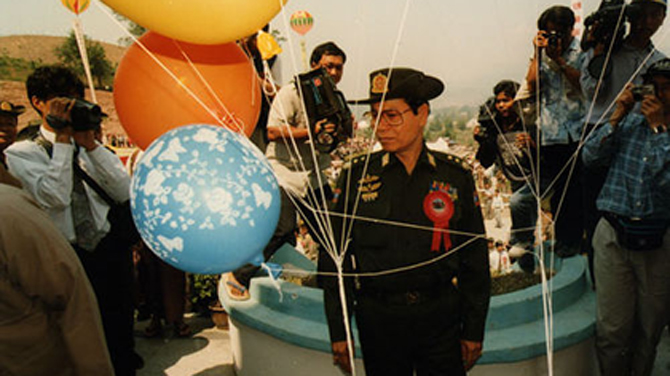This began with the murder of Gen Aung San, the leader of Burma’s independence struggle, and his entire cabinet by the henchmen of rival politician U Saw on July 19, 1947, just six months before Burma gained its independence from Great Britain. Then after Gen Ne Win seized power in 1962, Sao Shwe Thaike, the first president of Burma following independence, was killed while being held in detention in an assassination believed to have been carried out by Ne Win’s soldiers.
Ne Win himself was the target of assassination plots and attempts. In 1976, Capt Ohn Kyaw Myint made an attempt to kill the ruthless dictator and other state leaders, but the young military officer was arrested before his plan was carried out and he was later hanged. Afterward, Ne Win became so paranoid that he wore a steel helmet during golf outings for fear of being assassinated, Singaporean leader Lee Kuan Ywe recalled in his book,“From Third World to First.”
While there were several other assassination plots against Burma’s top military rulers between the time Ne Win took power in 1962 and resigned in 1988, most failed. The highest ranking military officer who was killed during that period was Brig-Gen L-Khun Hpang, an ethnic Kachin and the powerful commander of the Northern Command, who was assassinated in 1985 by the Kachin Independence Army, an ethnic armed group.
Attempts to assassinate the leaders of groups opposing the government were more successful during Ne Win’s reign and beyond. In 1950, Saw Ba U Gyi, the father of the Karen resistance movement and the former minister of revenue under British rule, was killed by government troops in an ambush. In 1968, Thakin Than Tun, a prominent communist leader, was also killed by a government agent in the Pegu Yoma range, where the Communist Party of Burma was based. More recently, in 2008 a leader of the Karen National Union, Mahn Sha, was killed in an operation reportedly led by a KNU splinter group, which is an ally of the government.
Wunna was released from prison in 2008 after spending 19 years behind bars. Now in his mid-40s, he still believes that assassination is a just way to avoid wars and to end people’s suffering, and that a successful assassination of Khin Nyunt would have benefited Burma despite the fact that the MI chief was purged in 2004 on charges of corruption and has been under house arrest ever since.
“Khin Nyunt was the key junta leader at that time. If he had disappeared from the military regime, there was no other general who was cunning and clever enough to continue to rule the country,” said Wunna, adding that the vacuum caused by Khin Nyunt’s disappearance from the junta would have lead to a better political landscape for the opposition groups to negotiate with the weakened regime.
At the time that Wunna embarked on his assassination attempt, Khin Nyunt was secretary 1 of the junta. He was also close to former dictator Ne Win, who still controlled the regime during the early 1990s despite having retired in 1988. Wunna and his colleagues believed that if Khin Nyunt was removed, then Snr-Gen Saw Maung, who had vowed to hand over power after the May 1990 election, would keep his promise.
With Khin Nyunt still in place, however, after Aung San Suu Kyi’s National League for Democracy won the 1990 election by a landslide, the junta did not keep Saw Maung’s promise, and Saw Maung was removed from his position in 1992 and replaced by Than Shwe, who went on to rule the country with an iron fist for almost two decades. When asked to give his perspective on the non-violent approach practiced by Aung San Suu Kyi during that 20-year period, Wunna said he respected Suu Kyi but didn’t think her method was effective.
“Look, Daw Aung San Suu Kyi herself was almost killed at least twice by the military regime’s thugs—in Rangoon in 1996 and in Depayin in 2003,” Wunna said.
“Daw Aung San Suu Kyi and her followers have used that non-violent method for the past 20 years, but there are more than 1,000 political prisoners still incarcerated today and except for a handful of the military and government leaders and their cronies, most of Burma’s 50 million people still suffer hardships,” Wunna added. “So if the source of those hardships and problems is gone, the people’s lives will be better off.”
While admitting that attempts to kill beloved and respected leaders such as Aung San and Mahn Sha have been more successful than plots against the lives of ruthless leaders like Ne Win and Khin Nyunt, Wunna still believes that assassination is the most effective tactic in a war against a dictatorial regime.

